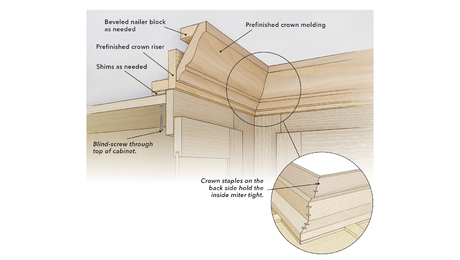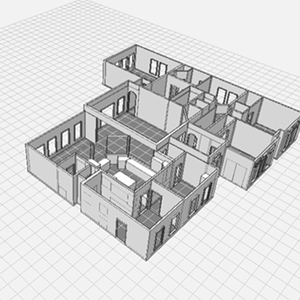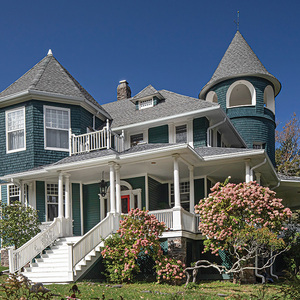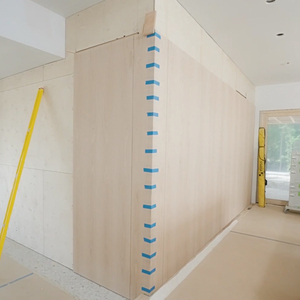I know this may be a broad question but what labor is a framer generally responsible for? Or better still, what should we be expecting one to do? Husband is currently interviewing a couple of different framers to assist in building new home. One fellow’s fee is 125% more than the other (no materials included with either). I have seen work done by the more expensive framer but not the other who has also been recommended by several folks (work not yet seen). I would like to compare apples to apples instead of apples to oranges but do not know where to begin.
p.s. Saw similar subject in House Chat where recommended be addressed in Breaktime. Now cannot find in either location. Appreciate your thoughts!



















Replies
What did the framers say was included? It can vary, but usually includes, well, all the framing, and can include things like exterior trim and setting windows. Did you ask for references, check out their work, get certificates of insurance?
Mike
We are just in the beginning stages so do not yet know all. Will keep you posted, but why I inquired is what if something is omitted & we do not know recognize at this point?
Plus workers are really busy in this area & for those who are not, well, we might be better off not using. 'Tis difficult to be too choosey...will just need to catch a good crew in between jobs.
Sadie,
It differs from framer to framer, region to region, and from one client to another.
I'll give you a place to start.
I will frame your home according to plans provided.
Apply all rake molding, build out facia boards and sophitts, install windows and doors exluding over head garage doors.
Apply roof shingles. (may depend on what you are specing)
Thats't the way I used to do it, when I was a young ape!
That gives you a dry secure house waiting for plumbing and electric subs and someone to trim oout and side the exterior.
Hope I helped.
EricI Love A Hand That Meets My Own,
With A Hold That Causes Some Sensation.
[email protected]
All framing,set windows and doors. Cornice,rakes etc are optional=extra. Have never seen a framing crew shingle too in my area.
Also have to build/install any steps. Have done some porches/decks but most of the time ,someone else does those. ahh....what was the question ?
No stairs from me. Built off site and installed.
EricI Love A Hand That Meets My Own,
With A Hold That Causes Some Sensation.
[email protected]
I've never heard of a framing crew not building and installing stairs. What part of the country are you guys in?
"I've never heard of a framing crew not building and installing stairs. What part of the country are you guys in?"I'm from New Jersey and framers never build interior stairs on new construction. Stair companies make them. Some companies install them and some don't so that means we will install them.Joe Carola
I'm in NY, and what Joe said.
Temps often while framing and even for a while after.
I've seen the framer built stair building process and I don't quite get it. You build stringers and then cover them. Why not build them once out of your finish material and be done with it?
EricI Love A Hand That Meets My Own,
With A Hold That Causes Some Sensation.
[email protected]
Off-site built stairs in CT, too.Andy Engel
Senior editor, Fine Woodworking magazine
Other people can talk about how to expand the destiny of mankind. I just want to talk about how to fix a motorcycle. I think that what I have to say has more lasting value. --Robert M. Pirsig
Have a question as "apply all rake molding" is not clear to me. Does rake molding include only exterior (gable area, etc.) or might this also include interior too?
Wish I had your knowledge in this biz to get all "apples to apples"!
rake molding include only exterior (gable area, etc.)
That is correct.
You go get a book or two on residential building techniques to familiarize yourself with all the parts of a house.
Valuable knowledge you need to know!!
EricI Love A Hand That Meets My Own,
With A Hold That Causes Some Sensation.
[email protected]
Around here, "framing" is building the structure according to plans & specs, applying the tarpaper on the roof, but not shingles. Although some framers also do shingles for an additional fee. install all windows & exterior doors (usually badly, as a trim carpenter, I had to re-hang more than half the exterior doors I encountered) The deck is usually included in "framing" but I can see where it might be an optional or negotiable item in other regions. Also, as I stated earlier, the framers build and install the stairs (with temporary treads, trim carpenters install the finish treads and risers.) In special circumstances, if there is a curved stairway, or something equally as specialized it might be subbed out to a specialist, but that only happens in very high end homes and is not the norm.
hi sadie
the framers might be charging a little extra because you have asked them to 'assist' your husband which really means 'teach' your husband. and that takes more time to babysit, make corrections, or redo something.
cheers and best of luck.
Tmaxxx
Urban Workshop Ltd
Vancouver B.C.
cheers. Ill buy.
Stop at the library and grab a book on framing/residential construction and get familiar with the terms and you'll have some specific questions to ask the framers. Also, the building inspectors around here won't give you a referral to an subs but some will tell you if they have had any problems with their work in the past.
In my area, some framers will do the roofing but not many. The others will sub the roofing to a crew they use (they pay) or put you in touch with them directly (you pay). Also, the price difference could include a ton of things, for that type of difference it has to be what you are getting, not just a higher price. They might be including the trim, house wrap, blocking for cabinets, knee walls for extra spaces, some might include doing the deck. Also, extended rakes (or boxed rakes, etc) will add to the cost, and around here a lot of new houses have the little roof returns and most framers will add $25 or $50 each for those.
Also, is it going to be vinyl (I hope not) or hardie or cedar? If one framer is pricing based on the house being vinyl and the higher price is based on cedar or hardie then the price difference will be the trim that goes alone with the cedar/hardie vs. the vinyl that doesn't have much in the way of trim.
Hopefully dieselpig will chim in on this post and give you the framers perspective on how he prices.
Thanks for a lot of help from all of you. From each of your posts, I pick up something new & add to my growing list. I will p/u a book at library on framing & construction so I can be better informed. No doubt Taunton has a good one too, I will also look there.
House will be brick & working on getting these folks lined up for work. Other groups being lined up include insulators, plumbers, electrical, cabinets/counters, garage doors, tile/ wood/carpet, septic w/line, footers, blocks, cement for garage. Whooo! One takes so much for granted when only viewing a house!
Irrigation for future cement work & landscaping already working via pump& hose for now. (via a creek - not the main water source as water is no cost there). Though premature, needed irrigation for soil to better settle. Site currently being prepared by hubby using dozer, loader, dump truck so as to retain top soil for later use. Having to build base up for garage & level the pad with the base soil being brought from rear of farm...kinda slow but sure from sunup to sundown! Believe he just likes running those machines! But he is ready to let "One Who Knows How" to do the real work.
water from creek for cement?
Salt water? fresh? brackish?
Tennessee water is fresh or at least that is what it is supposed to be; though some question this in some areas. This particular creek (small but runs year round) runs from a mountain spring. Would not drink this water as cattle are in the pond where it runs off the mountain; use antiseptic liquid soap for hand washing too. Should be good enough for mortar, etc. Will save a bunch!
Thought I had replied previously to your question - wonder where my post fell?
Water for building process...mortar, etc. is fresh here in Tennessee. Fortunate to have a creek just down the hill with a pump house on site when we purchased. It is providing water now to allow for the newly moved in soil for garage area to help settle. Hubby moved in 3 inches of soil, compacts with dozer over & over, then turns on the water to run overnight; 3 more inches of soil next day, etc. Appears to be working well.
Note aside from posting: For years have used a light bulb in this pump house during winter months to prevent freezing (winter averaged about $35/mo from one light bulb. This year installed heater with temp gauge this year & the electricity bill was halved to $17! Amazing what one light bulb burning all the time consumed!
Hubby moved in 3 inches of soil, compacts with dozer over & over, then turns on the water to run overnight; 3 more inches of soil next day, etc.
Oops!
Appears to be working well.
Not.
The main reason for putting tracks on big heavy tractors is to prevent soil compaction.
One of the enemies of good compaction is too much water. Compaction can only progress until there are no air spaces left in the grains. If the spaces between grains are filled with water, there will be no compaction. When the water leaves the material can collapse or settle.
IMO, you should consider buying a sheepsfoot rolling compactor to pull behind the dozer. You can sell it after the job is over.
SamT
Sam, thanks for your input as have browed a few posts discussing compaction & wondered if being done right or wrong? Hopefully, the trickle (not a lot of spray) of water being sprinkled will not overdo/prevent compaction. Unsure what types of tracks on equipment; just know they are different types.
Believe there is time for compaction results to evolve as the one framer we desired has injured his back. We hope to hear from the next framer in line this week-end and he is currently on another job at this time.
As to buying a sheepsfoot rolling compactor - we need no more eqp - I tell him we look more like a construction company than a farm! If needed, we can surely hire someone to do. Actually, has been succesful in buying, using for purpose & then selling eqp. But don't even wish to go there at this time. Thanks!
Believe there is time for compaction results to evolve as the one framer we desired has injured his back.
What does the level of compaction have to do with the framing of the building ?
Buildings are supported by footings which are placed on virgin ( untouched ) earth.
You really need to be careful with fill material and what you are putting on it. This kind of thing gives us regulars fits.
carpenter in transition
What does the level of compaction have to do with the framing of the building ?
Tim, regret confusion; just in my thanks for input to those who contributed toward helping me know what framing included...I simply input where project now stands. All in all, I better understand what some exposures may be.
Buildings are supported by footings which are placed on virgin ( untouched ) earth.
In TN, if one desires either a basement or crawl space, everyone digs down to a level.
You really need to be careful with fill material and what you are putting on it.This kind of thing gives us regulars fits.
Appreciate your identifying this caution. On a hill ran into punky (damp) soil in couple spots, dug punky spots out & replaced with loads of gravel, compacted, then 2 to 3 inches of chirt followed by compacting with more chirt loads added & compacted each time. Someone else recommended settling without wetting down, but that is how it is done here (perhaps why we have few cracks in our basement floor at current home with work completed by a professional. We definitely do not wish to give anyone a fit, so if you can suggest another method, I am open to suggestions.
Note: Punky soil is common here in the many parts of the TN valley (lots of underground water). Ridges & mountains have either rocks or sandy soil.
Appreciate your identifying this caution. On a hill ran into punky (damp) soil in couple spots, dug punky spots out & replaced with loads of gravel, compacted, then 2 to 3 inches of chirt followed by compacting with more chirt loads added & compacted each time. Someone else recommended settling without wetting down, but that is how it is done here (perhaps why we have few cracks in our basement floor at current home with work completed by a professional. We definitely do not wish to give anyone a fit, so if you can suggest another method, I am open to suggestions.
Sadie,
The reason we are focusing on your compaction comment rather than the scope of a framer's work is because it is alarming. It is alarming because there is a natural order of work that is typically done in the building of a home, and that is not being followed at your site. ( or so it seems from the info provided ) The usual order of the basics is:
Site survey
Home and site design including septic and well. Also includes determination of first floor finished floor elevation in relation to site. This is a critical element.
Permits
Site layout
Scrape and remove topsoil from affected area of home but not in the area of any on-site septic system.
Excavation for foundation to footing depth whether full basement, crawl space or slab. Footings MUST bear on virgin soil. If the bearing soil is questionable for bearing, an engineer must be contacted.
Footings and foundation
Foundation waterproofing and footing drainage system
Backfill foundation
Utility trenching
NOW comes the time when we typically fool around with grading the site depending upon our site plan and the elevation of the home. The fill material used around the home almost never has crushed stone layers. This makes for trouble with plantings and grass.
In simple terms:
Decide on the home's elevation, THEN dig the hole, THEN build the house, THEN fool around with your excavation equipment and the grade.
When you say things like we are worried about proper compaction before the framer gets here, you lead us to believe that you are going to build a home on dirt which has been touched. We call this building on fill.
And that would be the biggest mistake you will ever make.
carpenter in transition
In my post, I did not i.d. each & every step. At this point I wish I had not been so chatty & never mentioned. Site survey, layout completed, permits all approved. Septic approved with fellow to begin soon as he finishes up a job & no need to worry about this area having been disturbed. Fellow who drew plans (with engineering expertise) coming tomorrow to ensure on target with elevation, etc.
Still mystified about Virgin Soil before framer arrives as dirt has been touched & the only fill has been in the garage area. Some folks do layout, others footings, framing, etc. but don't even wish to continue this. All is entirely beyond my knowledge as I am no carpenter nor one in transition. Initially was just trying to determine precisely what does framing include as one framer is asking more than twice as much as another & their work looks comparable. High dollar framer builds houses for his in-law so he does not run out of work. Plus being new to this area & moving from where we now live, sounds like we have bundles - we don't; just hard working folks who have scrimped and saved and do not wish to be taken advantage of as some have done on the farm in providing chicken fertilizer (it was mostly old powder & produced little result), removing trees, etc! Now we do own fertilizing & have old eqp to do own tree work, ponds, landscaping, etc. Learned the hard way!
Conclusion: Have obtained a fairly good list & continuing to add to it to ensure there are no surprises to anyone. List will help to ensure comparing apples to apples! Mission accomplished thanks to you folks @ Breaktime!
Sadie
a few final thoughts:
we are here to help.
unfortunately, all of us here have been called upon by people just like yourself that want to GC their own home and then need help halfway through to clean up the ensuing mess. i hope you don't take the attitude of some posters here the wrong way. we tend to be an underappreciated bunch.
I felt that your framing question had been adequately answered. I felt it important to comment on some things you said which concerned me. The point of my response was to try and help prevent a mistake.
best of luck
carpenter in transition
Buy yourself a copy of the JLC Field Guide
http://www.jlconline.com/cgi-bin/jlconline.storefront/4266c68f0006191c27177f000001056c/Product/View/FG001
I think it will pay for itself several times over.
Viewed contents on line & looks great! http://www.jlconline.com/cgi-bin/jlconline.storefront/4266c68f0006191c27177f000001056c/Product/View/FG001
But at $69.95 that is a lot for one time use as this will be our last house to build. Hopefully the library or our designer may have it; he has a good size library!
Or perhaps I might purchase & provide to framer once completed. Might this be offensive though? Goodness knows, the knowledge for us might save more than $70 bucks!
I haven't seen the jlc field guide but I've heard it is very good. Yes $70 is expensive for a book but if it catches a mistake before it happens, it will be the best $70 you ever spent. Also, if there are mistakes that you are responsible for, not the subs screw up, it will be much more than $70 to fix it. Everything is relative.
"But at $69.95 that is a lot for one time use as this will be our last house to build. Hopefully the library or our designer may have it; he has a good size library!"
So...essentially you have very little knowledge about constrcution, yet decided to be the GC on your own house. To me, this quote speaks volumes about this project and your (lack of) understanding on how to manage it.
Sorry for being so mean, but leave this stuff up to a real professional.
Oh, c'mon--they do it all the time on tv, it can't be that hard, and look at the expensive shiny new trucks contractors drive--they must be raking in the dough!
Mike
It is much better to learn from the mistakes of others than repeating them. Unless you are quite experienced, the JLC Fleld guide is going to save you a lot more than the cost of the book.
Wonder if those TV guys take 'extended breaks and lunches'?? ahh....what was the question ?
You know office guys NEVER take extended breaks or lunches, or leave early....
Mike
"Wonder if those TV guys take 'extended breaks and lunches'??"Kevin was missing from last week's TOH. His wife just had their first baby. If he was a "real pro" he would not have let something like that stop him from working on the house.
Never liked Kevin that much...at least Steve used to strap on a toolbelt occasionally.lol ahh....what was the question ?
There is still 'stick-built'stairs around here,used to do them all the time. Nowadays maybe stairs going up into attic or basement. The rest are factory,be it pine or oak.
Either way, they are installed before we leave...no temps. Pine means they'll be carpeted,don't have to baby-sit them too much. Oak, they get carpet scraps or some luan on them for protection.
I don't understand "using temps until trades are gone". How is HVAC or electric guy gonna run their stuff if you don't build the walls under the steps?
Wait until sheetrocker finishes? Then come back and put real ones in?
Every house I've done, the roof is 'papered-in' a day or two after we've left...it's not like the steps will get rained on. ahh....what was the question ?